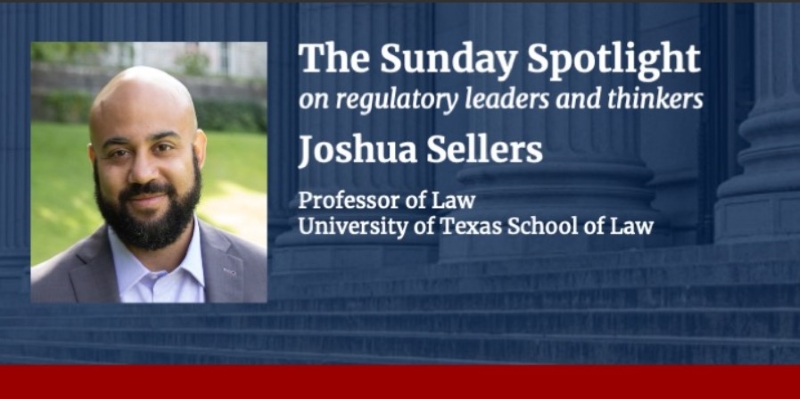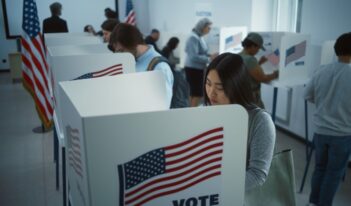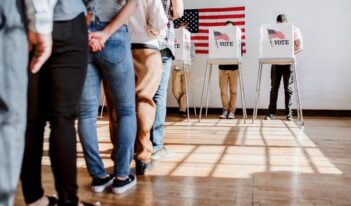
Joshua Sellers offers insight on the current state of U.S. election law and voting rights on the eve of the U.S. presidential election.
In a recent conversation with The Regulatory Review, election law scholar Joshua Sellers offers his analysis of voting rights, voter registration reform efforts, and the upcoming U.S. presidential election.
The right to vote is fundamental to U.S. democracy. That right, however, has been subject to various challenges and attacks in recent years. Voter registration is more decentralized in the U.S. than in peer nations, which often feature automatic registration and increased efforts by government officials to reach unregistered individuals. In addition, the rise of voting misinformation and, as Sellers notes, the weakening of the Voting Rights Act of 1965 (VRA) raise additional concerns about the integrity of U.S. elections.
Amid that backdrop, Sellers evaluates the current landscape of voting rights and U.S. election law. Sellers discusses how states and localities have modified their election laws following the Supreme Court’s monumental decision in Shelby County v. Holder. He argues that these modifications undermine the integrity of elections. Although he expresses several concerns about the upcoming election, Sellers notes that governments and local officials can institute safeguards to ensure that the election is administered fairly. Sellers also expresses optimism that innovative election reform ideas—such as automatic voter registration following a government transaction—will continue to take hold nationwide.
Sellers is a professor of law at the University of Texas School of Law, where he has taught since 2023. He holds a J.D. and a Ph.D. in political science from the University of Chicago. His dissertation evaluated the contemporary political function of the VRA. He previously taught at Sandra Day O’Connor College of Law and University of Oklahoma College of Law. Sellers was awarded the Berlin Prize by the American Academy in Berlin in 2022 and was elected to the American Law Institute in 2023, where he serves as an advisor for the Institute’s Election Litigation project.
The Regulatory Review is pleased to share the following interview with Professor Joshua Sellers.
The Regulatory Review: You have written that the VRA has been a critical tool for safeguarding voting equality, but you’ve also noted that the Supreme Court has compromised the VRA over time. How has the VRA been weakened?
Sellers: As initially designed, section 5 of the VRA required certain jurisdictions—both states and localities—with particularly egregious histories of race-based voting discrimination to seek federal preclearance before making any voting or election-related changes.
In 2013, the Supreme Court in Shelby County eliminated that requirement because, in the judgment of Chief Justice Roberts and the other justices in the majority, current voter turnout and registration data no longer justify the singling out of certain jurisdictions. Doing so violates what the Chief called “the principle of equal sovereignty.” The Court’s decision to weaken the VRA in this fashion—and to override Congress’s considered judgment that the preclearance provision was still necessary—was both inadvisable and activist.
TRR: How do these changes affect the integrity of U.S. elections?
Sellers: In the immediate wake of Shelby County, many jurisdictions no longer subject to preclearance enacted a rash of laws seemingly designed to restrict voter access. For example, some states enacted restrictive voter identification laws, some cut back on the number of early voting days, and some closed a troublingly large number of polling places.
Under the prior regime, each of these changes would have needed to be precleared; after Shelby County, such changes are still subject to legal challenge under the Constitution or another provision of the VRA—section 2—but the time and resources necessary to bring such suits are considerable. Moreover, the mere volume of restrictive laws signals to citizens that the state is, at best, indifferent concerning their political participation. When the fundamental right to vote and participate in politics is significantly compromised, election integrity is compromised.
TRR: Do you have any particular concerns about the upcoming presidential election?
Sellers: The upcoming presidential election presents a profound test of our election systems. Because the stakes are so high—control of the White House, Senate, and House of Representatives are all toss-ups—I expect that voter turnout will be high. That is, of course, a good thing, but it requires preparedness on the part of election administrators. It is essential that voters be afforded sufficient time and opportunities to participate, that enough ballots are prepared, that those in need of additional assistance, such as the elderly and disabled, receive help, and that ballot processing occurs in a timely manner.
At the same time, unforeseen events are inevitable. As I write this, for example, there is uncertainty over how elections in North Carolina, Georgia, and Florida will be administered, given the impact of Hurricane Helene and Hurricane Milton. Simply put, administering an election of this magnitude is a substantial infrastructural and organizational task. Logistical issues aside, I am, of course, concerned about the willingness of the electorate to accept the presidential election result and support the peaceful transfer of power. That such a large segment of the population continues to believe that the last presidential election was illegitimate reveals the fragility of democratic legitimacy. When democratic legitimacy dissipates, extra-legal challenges to the political order are more likely, as we so clearly saw on January 6, 2021.
TRR: What should the government do to address these concerns?
Sellers: Governments—and here I would emphasize how decentralized our elections are in the United States—should promote voter participation, ensure that voters have sufficient time and opportunities to participate, provide as much transparency as possible into the vote tabulation process, reassure the public about the integrity of the outcomes, and, where necessary, quickly respond to any threats to the well-functioning of the electoral process.
TRR: You wrote a report that compared voting registration processes in the United States to those in its international peers. What were some of the key differences you identified?
Sellers: The United States is unique among peer nations in placing the burden of registering to vote on individuals. Most Americans register or update their registration information at a Department of Motor Vehicles. This type of registration is convenient for some, but not all. By contrast, countries such as Australia and Canada are much more proactive in sending officials out to register people, and the opportunities to register exist at most government agencies and offices, not just one or two, as is true in most U.S. states. Unsurprisingly, the nations that take a more proactive approach have higher voter registration and turnout rates.
TRR: In that same report, you documented current voter registration reform efforts in the United States. Which reform efforts do you find most promising?
Sellers: Among the most promising reforms at present is what is known as “Secure Automatic Voter Registration.” Under this approach, which is currently employed in a handful of states, including, most successfully, Oregon and Colorado, eligible individuals are automatically registered during a government transaction and then contacted later with an option to opt out of registration. This seemingly subtle change—from requiring eligible individuals to affirmatively opt-in to registration to automatically registering them and then giving them the opportunity to opt-out—has been shown to meaningfully increase voter registration rates.
TRR: Are there reasons to be optimistic about efforts to improve the electoral foundations of U.S. democracy?
Sellers: This is a challenging moment for American democracy. Anxiety, frustration, skepticism, and even conspiracism are pervasive. But there is a silver lining to the mainstreaming of election law matters. All the attention has inspired a remarkable amount of public discussion about how American democracy might be improved. I cannot recall another period in modern American history in which so many innovative ideas were floated—and in some cases adopted—by states or localities.
Among academics, elected officials, and election administrators, insightful exchanges are occurring over the potential promise of ranked-choice voting, the public financing of elections, the extension of the right to vote to noncitizens and teenagers, online voting, the elimination of “top two” primary elections, and more. I am optimistic that some of these ideas will take hold across the country and profitably serve American democracy.



